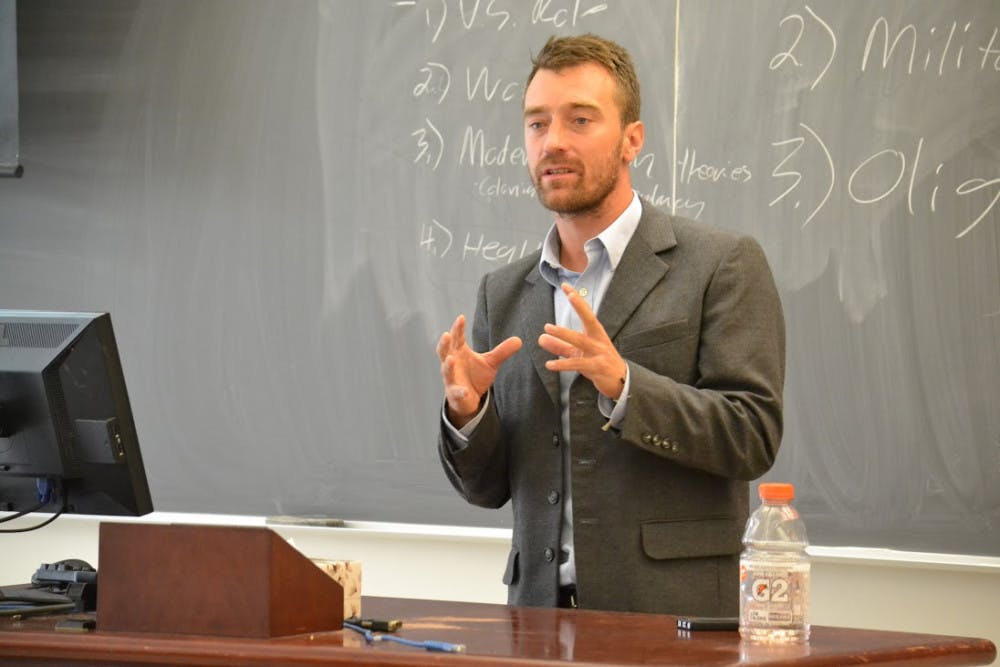By Tom Ballard Staff Writer
Human rights in El Salvador and the way the world views them were the main topics of discussion at this week’s Fall Politics Forum at the College.

Held on Friday, Sept. 25 in the Social Sciences Building, the presentation, entitled “Human Rights and Social Violence in Central America,” was hosted by Noah Bullock, executive director of Foundation Cristosal, a “faith-based human rights and community development organization,” according to their website.
At the beginning of his presentation, Bullock dabbled into the contemporary history of human rights in El Salvador and the rest of Central America.
“El Salvador, in this year, has sort of passed Honduras and become the most violent country in the world,” Bullock said. “But El Salvador is different from Guatemala and Honduras because there is no social protest movement.”
Bullock said that there is also no lack of corruption cases within the Salvadoran government while also expressing his dissatisfaction with the current attorney general, even admitting that he was part of a movement calling for resignation.
According to Bullock, there have been 5,000 murders in the country of six million people this year, with 911 of those murders occurring in the month of August alone. Bullock also claims that the murders are both government ordered and related to gang violence.
“In El Salvador… 2009-2011 were some of the most violent years… with homicide rates around 60-70 per every 100,000 (people)… In the U.S. it’s around two or three,” Bullock said. “The World Health Organization says that when you have homicide rates of 10 per every 100,000 (people) we have an epidemic – so homicide in El Salvador exceeds the 10 limit by six or seven times.”
Bullock claims that the Salvadoran government had put in place strict anti-gang measures in an attempt to curb crime. Criminalizing gang membership, however, allows police to arrest anybody who looks to be part of a gang.
“There’s a big debate about failed state — is El Salvador a failed state, what does a failed state mean — there’s a whole debate about that,” Bullock said. “I think it’s safe to say that the Salvadoran state is failing to protect its people and guarantee them security, and that’s one of the primary purposes of a state — to protect its people.”
Episcopal Chaplain Lisa Caton, director of the Center of Mindfulness and Compassion at the College, invited Bullock to visit the campus.
“I want people to understand how the U.S. government is involved in what happens in Third World countries — Central America,” Caton said.
In regards to the amount of time and effort that Bullock says the U.S. spends trying to help El Salvador compared to the rest of the world, it is like “an accounting error… it’s really minimal,” he said.
Bullock also cites the tension some Americans have toward immigrants along with the political complexity of accepting refugees as reasons for the U.S. being weary of getting involved.
“When you leave your country and request or apply for asylum the message being said is that ‘my country failed to protect me,’” Bullock said. “So if the United States takes or accepts people from El Salvador, it’s a recognition of the failure of a state that is also an ally.”
Bullock also commented on the mind-set of Americans in terms of viewing the current state of El Salvador.
“I think people are pretty pessimistic right now,” he said. “I think what is needed is... to strengthen democratic institutions in the country that has a mean to solve problems peacefully, and I think that a focus on military solutions weakens the democratic institutions… So in that sense, I think it looks bleak.”
Many in attendance seemed to enjoy the presentation, happy to be a part of Bullock’s discussion.
“There’s nothing like getting direct contact from someone who has been on the ground,” Canton said. “To give you the sense of reality outside of the grounds of campus.”
The presentation was part of the four forums that the Political Science Department is bringing to campus this fall. The next will be held on Tuesday, Sept. 29, in the Education Building, room 113.
“It’s great to see the Political Science Department offering students the opportunity to further their knowledge through open forums,” sophomore business and political science double major Robert Mitchals said.







